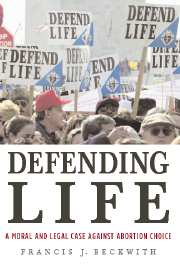Book contents
- Frontmatter
- Contents
- Acknowledgments
- Introduction
- PART I MORAL REASONING, LAW, AND POLITICS
- PART II ASSESSING THE CASE FOR ABORTION CHOICE AND AGAINST HUMAN INCLUSIVENESS
- PART III EXTENDING AND CONCLUDING THE ARGUMENT
- 8 Cloning, Bioethics, and Reproductive Liberty
- 9 Conclusion: A Case for Human Inclusiveness
- Notes
- Selected Bibliography
- Index
9 - Conclusion: A Case for Human Inclusiveness
from PART III - EXTENDING AND CONCLUDING THE ARGUMENT
Published online by Cambridge University Press: 05 June 2012
- Frontmatter
- Contents
- Acknowledgments
- Introduction
- PART I MORAL REASONING, LAW, AND POLITICS
- PART II ASSESSING THE CASE FOR ABORTION CHOICE AND AGAINST HUMAN INCLUSIVENESS
- PART III EXTENDING AND CONCLUDING THE ARGUMENT
- 8 Cloning, Bioethics, and Reproductive Liberty
- 9 Conclusion: A Case for Human Inclusiveness
- Notes
- Selected Bibliography
- Index
Summary
The purpose of this final chapter is to offer a summary of the case I make in this book for the argument I offer in the book's introduction:
The unborn entity, from the moment of conception, is a full-fledged member of the human community.
It is prima facie morally wrong to kill any member of that community.
Every successful abortion kills an unborn entity, a full-fledged member of the human community.
Therefore, every successful abortion is prima facie morally wrong.
This argument is deductively valid. That is, if the premises are true, the conclusion follows. And if the premises of a valid argument are true, then the argument is sound. And if the above argument is sound, then the pro-life position is morally correct. But are the premises of the above argument true? I believe that the case I made in this book shows that they are true. Let me briefly summarize that case.
First, we saw that the unborn is biologically an individual member of the species, Homo sapiens, from the moment of conception (Chapter 4). Furthermore, we concluded that attempts to exclude the unborn from protection during some or all of its gestation are unsuccessful. Because none of the attempts to isolate the preborn from the community of intrinsically valuable human beings succeeds, and because the substance view of persons provides the best accounting of human beings and their intrinsic value from the moment they come into being (Chapter 6), it follows that the unborn entity, from the moment of conception, is fully human, a person entitled to the human community's protection.
- Type
- Chapter
- Information
- Defending LifeA Moral and Legal Case against Abortion Choice, pp. 226 - 230Publisher: Cambridge University PressPrint publication year: 2007



